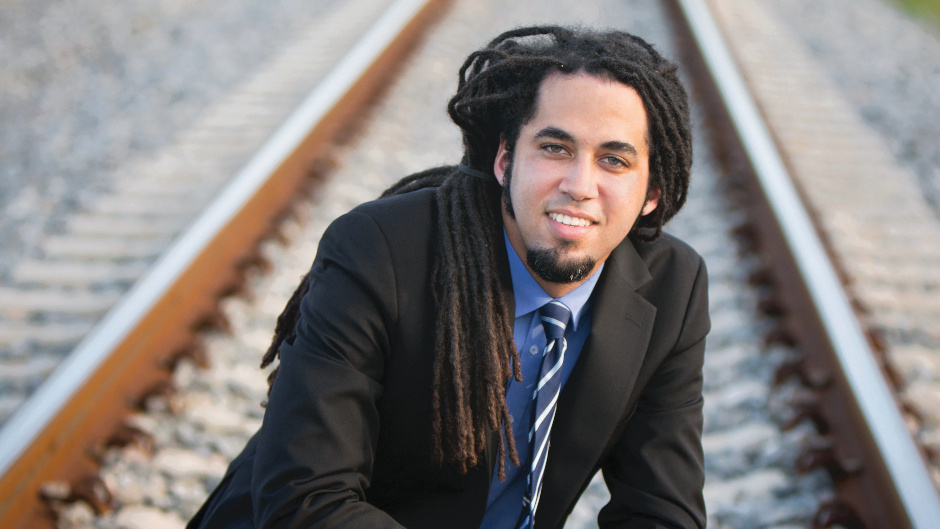Written by: CARLOS HARRISON
The die was cast early. And, Malik Ramelize says, deliberately.
Sharing a name with one of America’s greatest legal minds meant he’d at least think about the law. So, he says, when his father gave him the middle name Thurgood, “he knew exactly what he was doing. There’s no doubt that he gave me that name with the hope of me one day becoming an attorney. And I
thank him for it because I love the name. Thurgood Marshall was not only one of the greatest Supreme Court justices of our time, he’s one of the most influential people of our time. He broke barriers that people thought couldn’t be broken.”
And while those are certainly big shoes to fill, Malik Thurgood Ramelize seems determined to make a mark of his own, beginning with the lives of individuals, and especially since he knows the people he meets in jail and defends in court could easily have been him.
Growing Up on the Streets
“I came from an area where I’ve been to jail, where I’ve been shot at, where I’ve had interactions with police, where I’ve watched my friends die,” says the Miami Scholar. “I was running the streets. I was hanging out with the wrong crowd.”
His dad was an assistant state attorney but moved away to Chicago to work in the juvenile justice system there. Ramelize stayed behind in Delray Beach with his mother, a pediatrician.
“We come from a long line of helping other people,” he says with a chuckle.
Growing up, though, he got an uncomfortably large exposure to the law, he says, mostly from the wrong side. But what he saw made him think he could be different, and that he could make a difference.
“Every year since I was 14, I’ve had at least two friends die. And whether that’s from gang violence or whether that’s from drugs or whether that’s just an automobile accident, I noticed how little things that might seem insignificant to other people really changed the course of their lives,” he says. “I saw it in
my friends and I wanted to help other people overcome that.”
Navigating His Way to Help Others
Throughout high school and beyond, though, he still hadn’t figured out how. He went to community college in Gainesville, at least in part to separate himself from his neighborhood environment, and considered going into psychology.
He came back to South Florida two years later with the idea of working in the law, but not necessarily as a lawyer. He enrolled at Florida Atlantic University as a criminal justice major. A professor there inspired him. Ramelize joined FAU’s criminal law society, applied for law school, and interned at the
Broward County Public Defender’s office before he even began at Miami Law.
“They always say that you do your first internship at the public defender’s office, and you either immediately love it or know it’s what you want to do. Or you hate it and you’re like, ‘I’m over this.’”
Aha Moment Interning for Broward Public Defender Leads to Law School
“I immediately loved it,” he says. “I thrived. I loved interacting with the clients. I loved interacting with attorneys. I loved the adversarial system in general, where it’s a perfect chess match between the state attorneys and the public defenders and the defense attorneys and the judge.”
One of the first things he noticed when he got to UM, though, was that there was no Criminal Law Society.
“I said to myself, ‘Well, this is weird,’” Ramelize says. “’How can we have the Bankruptcy Law Society, the Immigration Law Society, all of these different societies, and we don’t have a criminal law one?’”
He teamed up with Regan Woodbury, J.D. ’18, to change that. By the end of his first semester, they had revived the dormant society. Two years later, he’s its president. And now, in addition to recruiting members and organizing events for the group, he’s racking up honors as a J.D. student and turning his
attention to other law-related activities on and off campus.
He’s treasurer of Miami Law’s chapter of the American Civil Liberties Union, was inducted into the Society of Bar and Gavel, and serves in the empowered youth program, helping young people build skills for success.
He was awarded the Thomas S. Wilson Jr. Scholarship, which is given to minority students who have shown a strong dedication to social justice and public interest. And he went back to jail—to work with clients as a legal intern for the Palm Beach County Public Defender’s Office.
“Those are the people that the system takes advantage of, the people that can’t afford an attorney, or can’t afford bail or can’t afford bond and, you know, can’t afford to buy their way out of the situation,” he says. “Those are the people who need the most help.”
Last year, as a 2L, he participated in Miami Law’s Innocence Clinic. And he found another way to give back, in the STREET Law Program.
“It’s one of my favorite things about law school,” he says, “because so many kids, especially in Miami, come from an area where they don’t witness anyone do better than what they’re already doing. They’re stuck in a bubble, so they think that they’re stuck. I want to show them that they’re not.”

